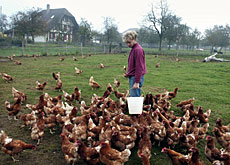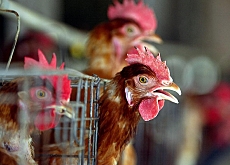Swiss order poultry to be kept indoors

The Swiss government said on Friday it had banned the keeping of poultry outdoors to avoid possible contact with migratory birds carrying avian flu.
The measure, which will be in force for the next two months, follows similar measures by neighbouring countries.
“The measure is a precautionary step,” said an economics ministry spokesman.
The order, which follows similar action taken in Germany and Austria, comes into effect next Tuesday and runs until December 15.
It also affects poultry markets and shows and is aimed at protecting domestic fowl from birds migrating from the east.
The restrictions will end with the migration period. Migratory birds are feared to be carriers of the H5N1 avian flu virus.
Officials also ordered all poultry to be registered.
Reacting to the news, poultry farmers’ associations said they understood the measures.
Also on Friday, officials said tests carried out on migratory birds over the past month by the Federal Veterinary Office had revealed no traces of the bird flu virus.
Poultry imports
Switzerland has already banned poultry imports from countries affected by avian flu, including Turkey and Romania.
Other precautions include recommendations for poultry farmers, increased border checks and a monitoring programme for wild birds.
The Swiss authorities have insisted that they are well prepared for bird flu and are bracing themselves for the worse case scenario of a highly contagious human strain of the virus.
They have been stockpiling enough supplies of an anti-viral drug for two million people. However officials say there is no reason for panic.
On Wednesday, Interior Minister Pascal Couchepin even went so far as to criticise the “hysteria” surrounding a possible bird flu pandemic.
swissinfo with agencies
The H5N1 strain first emerged in Hong Kong in 1997, when it caused the death or destruction of 1.5 million birds. Eighteen people fell ill, of whom six died.
It re-emerged in 2003 in South Korea and has spread to several Asian countries including China, Vietnam, Cambodia, Thailand, Laos and Indonesia.
This summer it also appeared in Russia and Kazakhstan, and recently in Turkey and Romania.
So far H5N1 has killed at least 60 people.
Domestic fowl can be immunised against bird flu, but there does not yet exist a vaccine for humans.
Antiviral drugs, such as Tamiflu, are the only medical defence.
Many questions have been raised in the media about whether its Swiss producer, Roche, can make enough of the drug.
On Friday the pharmaceutical company said that it would ration the amount of Tamiflu handed out.

In compliance with the JTI standards
More: SWI swissinfo.ch certified by the Journalism Trust Initiative


You can find an overview of ongoing debates with our journalists here . Please join us!
If you want to start a conversation about a topic raised in this article or want to report factual errors, email us at english@swissinfo.ch.